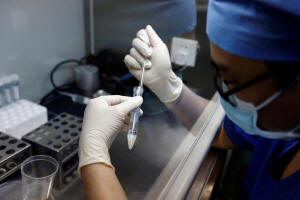China launches campaign to crack down on illegal fertility treatments
 Send a link to a friend
Send a link to a friend
 [July 11, 2023]
HONG KONG (Reuters) - China will "severely crack down" on illegal
activities related to the use of assisted reproductive technologies such
as the buying or selling of sperm or eggs and surrogacy, in a six-month
campaign to assuage widespread public concern. [July 11, 2023]
HONG KONG (Reuters) - China will "severely crack down" on illegal
activities related to the use of assisted reproductive technologies such
as the buying or selling of sperm or eggs and surrogacy, in a six-month
campaign to assuage widespread public concern.
Fourteen government ministries including the country's National Health
Commission (NHC) said in a statement that assisted reproductive
technology can only be used in the country's 543 approved medical
institutions.
"In recent years there have been illegal application of fertility
technology from time to time which has aroused widespread concern in
society," a statement from the NHC said.
In order to standardise the application of assisted human reproductive
technologies, the government said it will focus on suppressing illegal
and criminal activities including forgery and buying and selling of
birth medical certificates from June to December this year.
"The illegal use of human assisted reproductive technology such as
surrogacy and illegal collection of eggs seriously damages women's
health and rights," the NHC said.

The issuance of false birth medical certificates have caused illegal
detention and trafficking of women and other crimes that seriously
violate the rights and interests of women and children, it said.
[to top of second column]
|

A doctor extracts semen specimen, at the
embryologic laboratory of the assisted reproductive centre, at the
Beijing Perfect Family Hospital, which specialises in fertility
treatments, in Beijing, China April 6, 2023. REUTERS/Tingshu
Wang/File Photo
 The NHC said other measures would be
rolled out including strictly managing patient identification,
strengthening the approval and verification of human assisted
reproductive technology and increased penalties for medical
institutions and personnel who violate regulations.
Concerned about rapid ageing in China, the government's political
advisers proposed in March that single and unmarried women should
have access to egg-freezing and in vitro fertilisation (IVF)
treatments, among other services.
China currently only allows married women to access fertility
treatments such as IVF and egg-freezing technologies.
(Reporting by Farah Master and the Beijing newsroom; editing by
Devika Syamnath)
[© 2023 Thomson Reuters. All rights
reserved.]This material may not be published,
broadcast, rewritten or redistributed.
Thompson Reuters is solely responsible for this content. |